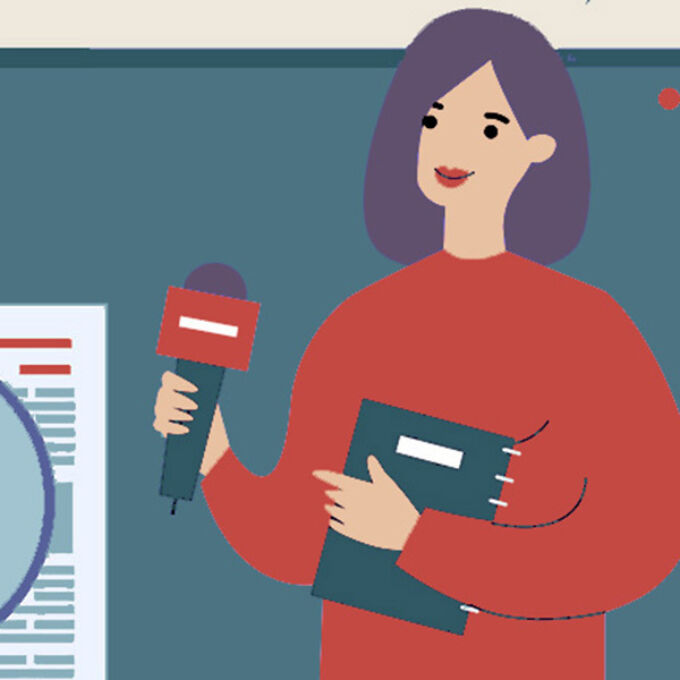What's wrong with objectivity?
Wallace argues that objectivity in journalism, as it's historically been understood and practiced, can be a way to maintain the status quo at the expense of marginalized communities.
He believes other practices could augment and potentially supersede the notion of "objectivity." These include rigor and transparency.
Journalists should diligently fact-check and carefully confirm that their sources and information are reliable and accurate.
Journalists should be open about who they are and how their identity may shape their perspective.
Ethics or economics?
Objectivity came into practice in the 1930s to increase newspaper sales by not offending any potential readers. The concept became associated with quality, professional journalism as early journalism schools sought to differentiate their graduates from the average citizen.
As in the early 20th century, financial motivation shapes today's news. While maintaining objectivity in each individual story, the news outlet can hand select which stories are covered. In this way, they can avoid reporting stories that would offend or turn-off valuable viewers, listeners, and readers. This practices allows many important stories to go untold. This problem is likely to increase as more and more media outlets are consolidated through mergers. For more on media consolidation, check out our interview with former FCC Commissioner Michael Copps.
Wallace posits that this effort to please everybody actually pleases nobody and, more importantly, deprives journalists of a moral or ethical compass guiding what is said or unsaid. That lack of moral guidance, Wallace says, is why journalists too often to defer to the status quo.
The "A word"
Advocacy can be something of a dirty word in the realm of journalism. Advocating means taking a position, which goes against the notion of journalistic neutrality—aka, objectivity. However, this can be yet another means of maintaining the status quo and keeping diverse voices out of newsrooms. In this case, "objective views" can come to represent "majority opinion," thus those with marginalized identities are unfairly labeled as engaging in "advocacy” for going against the majority.
When mainstream media ignore certain topics, the only people left to cover them maybe individuals who are embedded in the communities central to the story. Yet, no matter how rigorous their reporting is, people can be dismiss it as "advocacy."
Journalists like Wallace argue that normalizing the understanding that all humans—even journalists—have existing biases and ideologies that will undoubtedly influence their coverage of an issue can help level the playing field and create a more inclusive industry where marginalized voices are more likely to be heard.
What does pro-democracy journalism look like?
Objectivity is not the only journalistic practice being challenged. Calls for pro-democracy journalism are leading outlets to come up with new frameworks and focuses for their reporting. Wallace shares the example of Outlier Media, a Detroit-based service journalism organization that identifies, reports, and delivers valuable information to empower residents to hold landlords, municipal government, and elected officials accountable for long standing problems. While this doesn't fit the model of what many people consider "journalism," Wallace and other view this is a type or reporting that serves the public interest.
"It's direct economic news for the consumer, which people aren't familiar with for low income people. We get a lot of direct economic news all the time about things that rich people value, like the stock market. But when it comes to the things that sort of shape the lives of low income people every day, the idea of like, 'Oh, you should be able to access all the information that you need about your economic future,' is not as common of an idea. And Outlier Media just says, 'That's what we're going to do, and we don't care if you don't think it's journalism.'"

I really want to see a fundamental change in news literacy and how people understand the process of making news so that it's not about whether it's performing the objectivity, it's about whether it's well reported, researched, and verified, and that we actually have the tools to assess that.
Lewis Raven Wallace, award-winning independent journalist and current Ford Global Fellow and Abolition Journalism Fellow with Interrupting Criminalization
What do you think?
Keep in mind
- Objectivity has the potential to maintain the status quo at the expense of marginalized communities.
- The decision of which stories get covered is at least as important than how those stories are covered.
- Political polarization benefits those in power.
- Rigor and transparency are as important, if not more so, than the notion of objectivity.
Listen & Subscribe
Listen to Episode 108: a Pro-democracy Case Against Objectivity and subscribe to our News Over Noise podcast to continue learning how to balance staying informed while protecting your well-being and the public good.


